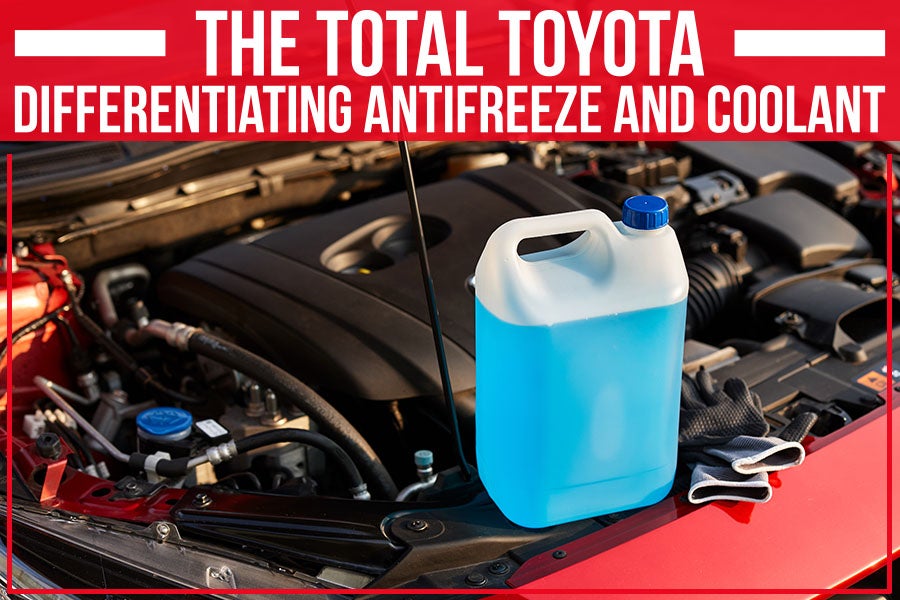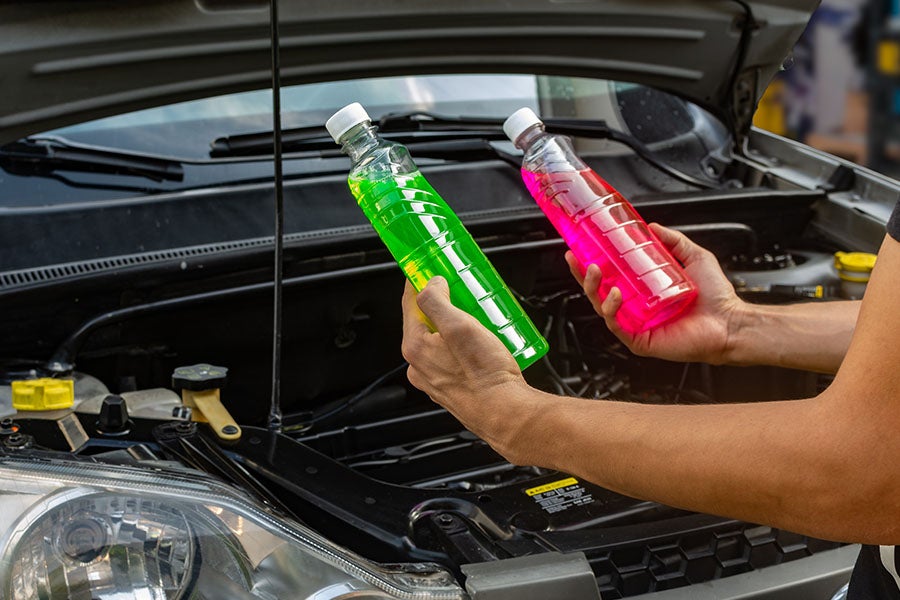The Total Toyota: Differentiating Antifreeze And Coolant

Key Takeaways:
- Mixtures of coolant and antifreeze keep the engine from overheating, but the combinations do this by carrying out several tasks.
- While antifreeze keeps the car coolant from freezing in low conditions, the coolant absorbs and distributes heat.
- With frequent usage, coolant can become acidic, which can cause engine rust.
- Experts advise checking coolant levels and often adjusting the mixture.
- Before selecting the proper mixture for your car, it is imperative to check the owner's handbook and qualified auto experts.
Suppose you've never owned a car or worked with radiator fluid. In that case, the distinction between car coolant and antifreeze could appear a little hazy. The words may occasionally be used synonymously or about just coolant. However, they are not the same. Each fluid contributes to the smooth operation of your engine in different ways, and they all work together.
Here is a brief explanation by Supreme Toyota of Hammond of the two radiator fluids and what you should know about them.
What Is Coolant?
It is a water-based solution that comprises dilute antifreeze, corrosion inhibitors, and sometimes additives to prevent advanced forms of corrosion. It is composed of water and glycol (which happens to be the main ingredient in antifreeze), raising the boiling point and decreasing the water's freezing point. That way, your engine will always maintain a constant, controlled temperature regardless of how hot or cold it is outside.

How Does Coolant Work?
Coolant circulates in the radiator and engine pipes and absorbs heat to prevent the engine from overheating. The car coolant carries and transports the heat away from the engine, cools it off in the radiator, and then circulates it back through the engine. A liquid with a high heat-bearing capacity must be used as the coolant.
What is Antifreeze?
It is a family of compounds with a glycol basis that prevents the coolant from freezing in cold weather and overheating in warm weather. It achieves this by reducing the freezing point and boosting the coolant's boiling point. Your coolant will be able to perform as intended, regardless of the weather.
What's The Composition?
It is made up of propylene glycol or ethylene glycol. These two components are combined with water to produce a solution with a lower freezing point than water alone. Depending on your location and climate, the combination may include more or less ethylene or propylene glycol. Consider the scenario when you live somewhere with extremely frigid winters. If so, you'll want more of the fluid to keep your engine’s lines from freezing.
Suppose there is too little antifreeze in your car in a cold location. In that case, the coolant will freeze in the engine fluid grooves & the expanding liquid can cause structural cracks in the engine. The car won’t even start.
If too little antifreeze is in your car in the summertime, the coolant will turn to seam and cause a radiator blowout. These fluids are essential.
Do You Need to Change Your Coolant?
Yes, you do. Over time, the water in the car coolant will evaporate. As it does this, it will leave behind ethylene glycol and propylene glycol. This can cause your coolant to become corrosive. When this happens, it can damage engine parts like aluminum and cast iron. It can also lead to engine overheating.
You'll need to change your coolant every few years to prevent this from happening. The specific time frame will depend on the coolant you're using and your driving habits. For example, you may need to change the car coolant more regularly if you constantly travel in traffic or in bad weather.
A Guide for Changing Coolant:
It's a rather simple method to change your coolant if you need to:
- To locate the radiator, and drain plug, see your car's owner handbook. After finding it, remove the plug and let the old coolant drain. Be careful to collect the coolant in a pan so you can properly dispose of it.
- Replace the drain plug after thoroughly cleaning the radiator. Once the radiator is empty, you may add fresh coolant up until the "full" line in the car coolant reservoir by removing the pressure cap.
- To check for leaks, replace the pressure cap and start your automobile.
Why Is It Dangerous to Drive with Low Coolant Levels?
Your car's cooling system circulates a specific coolant through the radiator to prevent the engine from overheating. If the coolant level falls significantly, the engine may overheat and suffer significant damage. Because of this, you should routinely check the amount of your coolant and top it off as necessary. But merely adding extra coolant won't cut it. The car coolant must be frequently cleansed and replaced to avoid corrosion and the buildup of deposits. These buildups can block the radiator and result in various issues over time. Having your cooling system cleansed and refilled at least once every two years is the best method to prevent all of this.
Signs Your Engine is Overheating:
The warning sign of engine overheating, which might result in a breakdown if you don't respond quickly, is an overheated engine. Below are a few warning flags to watch out for:
- Coolant is leaking from the engine.
- A burning smell is coming from the engine.
- Steam billowing out from under the hood.
- The engine light is on.
It's crucial to stop right away and ask for help if you see any of these indicators.
Different Coolant and Antifreeze Mixtures:
It's critical to select the proper coolant and antifreeze combination for your automobile from the variety of options available on the market. The most typical kind is a coolant of glycol and water mixed 50/50. Your engine will be protected by this combination up to -34 degrees Fahrenheit. Use a greater glycol percentage coolant if you reside somewhere with cold winters.
Before making a choice, seek advice from a qualified auto mechanic or the owner's handbook to determine the ideal combination for your automobile. If you aren't trained to handle the fluids, try to avoid blending your car coolant mixtures.
Ending Note:
Antifreeze and coolant both serve an important purpose in keeping your engine running smoothly. You run the danger of the engine overheating if your car coolant and antifreeze levels are too low.
Want Help With Cooling Your Engine?
Supreme Toyota, serving Tickfaw, LA, provides thorough car repair work for Toyotas and other makes of automobiles. Our experts provide a wide range of services, including oil changes, tire inspections, safety checks, engine replacements, and much more.
Feel free to schedule your service today with our expert team!


